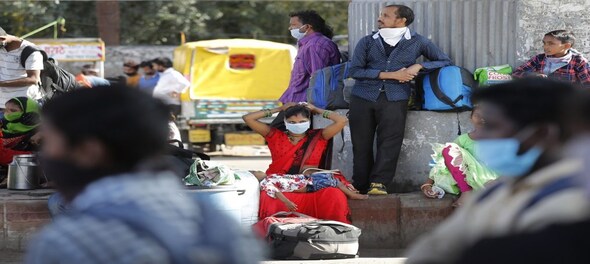
Fifty days since the nation went into one of the strictest lockdowns, and 47 days after the first tranche of Gareeb Kalyan package, Finance Minister Nirmala Sitharaman on Thursday announced that the government will supply food to eight crore migrant workers in the country for the next two months. This along with promises of affordable housing and loans for street vendors, none of which are immediate reliefs.
“Non-card holders (national food security act or state-level cards) will receive 5 kg of wheat or rice and 1 kg chana per family. We are engaging with state governments to approach and identify the migrants," Sitharaman said.
The government has allocated Rs 3,500 crore for the food supply. While this is much-needed support, experts say this has come in too little too late.
Availability of food and ration was the biggest and universal problem for the daily wagers, particularly migrants, who saw all their work opportunities cease during the lockdown. Most migrant workers during the lockdown period have survived on petty loans of Rs 500-600 and food packets being distributed through community kitchen run by government or NGOs. Many had said they were surviving on one meal a day, and so were migrating back to their native villages on foot, where again, they may not have work opportunities. There could some hope, with the FM highlighting plans to push the rural employment guarantee scheme MNREGA.
But hopes of any direct income support for migrant workers who lost their livelihoods were dashed. And the long-drawn process of identifying 8 crore non-card holder migrants poses its own set of challenges.
Reetika Khera, IIM Ahmedabad said, “Addition of 8 crore people to Food Security Act will not bring up the coverage to even the mandated level. The crisis now demands we go beyond the mandated. We have a problem of excess food stock in our granaries. Plus how will these 8 crore people be identified?”
4.1 crore people were inter-state migrants and 1.4 crore people migrated (inter and intra-state) for employment, according to the Census 2011.
The Finance Minister further added that the state governments will be responsible for the implementation of the measures including the identification of migrants, distribution, and for providing detailed guidelines. The FM also highlighted that states have accessed Rs 11,000 crore through state disaster relief fund that has been used for supporting migrants.
In the same breath, the FM also announced the implementation of “One Nation One Ration Card” benefiting 67 crore people in 23 states covering 83 per cent of PDS population.
“They will be covered by national portability by August 2020,” Sitharaman said. The proposal that has been slated to become operational from June 1, 2020.
The concern here is many migrants don’t carry ration cards and leave it back home for their families to use. While the government is talking of linking Aadhar cards to the PDS cycle and apportioning ration to family members in multiple areas, this is a long-drawn process.
Sitharaman also announced an affordable rental housing scheme for migrant workers besides a Rs 5000 crore special credit facility for nearly 50 lakh street vendors. Again, none of which will be of any immediate assistance. Credit-based packages and schemes take time to be implemented.
“There is a fixation on liquidity-based measures and less on actual spending, which is the need of the hour now that there’s huge compression of demand. Don’t see much point of all these loans,” says Amit Basole, Associate Professor of Economics at the School of Liberal Studies, Azim Premji University.
In a separate announcement yesterday the government had announced that Rs1,000 crore will be allocated from the PM Cares Fund for migrant relief work by states, namely providing shelter, food and transport.



